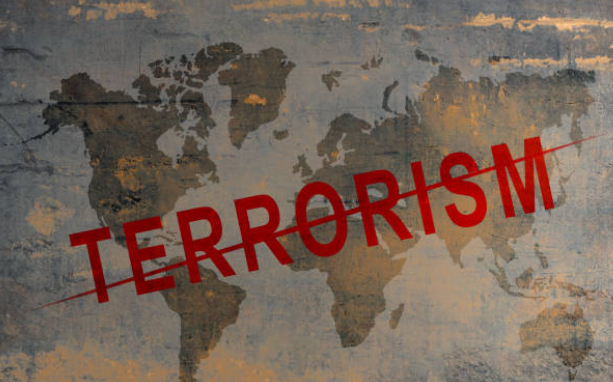By G. Al Smith
Terrorism remains a critical concern at the global level that poses a severe issue to international and national security. The evolving and persistent nature of this threat needs a multifaceted strategy that is responsive to both domestic and global facets of terrorism. In recent years, the prominence of domestic-level terrorism has increased, which has complicated the issue as well. It is crucial to evaluate the broader range of reasons that cause terrorism, which often originate from economic, ideological and sociopolitical factors. The effect of terrorism extends far amidst physical danger, it can erode social cohesion, challenge democratic principles and disrupt economies.
As a domestic and international issue, terrorism has many aspects and deep roots. Understanding the various causes of terrorism and the intricate ramifications it has is essential to properly addressing it. These sociopolitical causes are extreme ideologies, economic inequality, and political unpredictability. According to Huff & Kertzer (2018), the ramifications of terrorism extend beyond mere physical injury; they involve extensive social, economic, and political ramifications that impact societies, economies, and democratic principles.
Diverse Perspectives and Alternate Solutions
Taking Action Against Violent Extremism (Countering Violent Extremism):Giving CVE programsŌĆöwhich try to stop radicalization through community involvement and deradicalization initiativesŌĆöprioritization is one strategy. Although proactive, the effectiveness of this approach can be challenging to measure, necessitating ongoing evaluation and modification of CVE methods.
Improved Border Defense:Helbling & Meierrieks (2022) suggest that increasing border security is another practical way to stop terrorists and their supplies from infiltrating. However, it is crucial to balance security and compassion so that strict border controls do not undermine humanitarian principles and international collaboration.
Dispute Settlement and Diplomacy:Extremist organization emergence can be considerably reduced by addressing the underlying causes of terrorism through diplomatic initiatives and conflict settlement. However, resolving deeply ingrained problems can be difficult and requires persistence and patience during negotiations.
Reform of Intelligence: Effective counterterrorism requires reforming the Intelligence Community. Improving the effectiveness, cooperation, and openness of the Community is crucial, and the following suggestions explain how this might be done.
The Multilateral Strategy, which entails prioritizing intelligence sharing and multilateral collaboration with foreign partners should be a top priority for the national plan. This requires fortifying ties, working on counterterrorism initiatives, and aligning legislative frameworks. Holbrook & Horgan (2019) recommend that since terrorism frequently crosses national boundaries and acts on a worldwide scale, a cohesive global strategy makes use of pooled intelligence and resources while enhancing global stability.
Another strategy is Intelligence Community Enhancement, which involves improving the entire counterterrorism effort required to reform the Intelligence Community. In order to improve effectiveness and responsiveness, this is highly suggested.
Streamlined CommunicationSupport for data sharing and cooperation between diverse intelligence agencies, can also break down the silos of information. This prevents redundancy and ensures a free flow of data, which agencies can collaborate more efficiently.
Technology Investment is another viable strategy. This entails making investments in developed technology for data surveillance, monitoring and analysis and involves utilizing machine learning and artificial intelligence for initial threat detection, a critical trait in the present era, where much of the data used by terrorist networks is disseminated online.
Cultural diversity also encourages diversity among Intelligence Community members to improve comprehension of global dynamics, lessen prejudices, and forge closer bonds with diverse populations. Martin (2021) advises that a varied workforce can help combat terrorism because it can better understand the subtleties of threats from around the world and build relationships with impacted populations.
Accountability and oversight to prevent overreach and safeguard civil liberties is imperative to establish robust procedures for supervision and accountability. Even in the name of national security, public trust and democratic principles must be upheld, which requires transparency and monitoring.
The challenge of terrorism is dynamic and multi-dimensional. By strengthening global cooperation, addressing the root causes of terrorism and reforming the intelligence community, the national approach can be more efficient in countering this diverse or complex threat. Terrorism might remain a significant challenge, but with the assistance of the right policies, this world can mitigate its effect and safeguard national security. The multifaceted strategy acknowledges the changing nature of terrorism as it pursues to postulate an extensive solution that encompasses domestic and global dimensions.┬Ā┬Ā ┬Ā
┬ĀAbout the Author

G. Al Smith is a Criminal Justice, Homeland Security, and Counter Terrorism Expert.┬Ā He earned a Master of Arts in International Relations, and Global Security with a concentration in Conflict Resolutions at American Military University, He also earned another Master of Science in Criminal Justice with a concentration in Homeland Security from Colorado Technical University. Prior, he received a Bachelor of Science in Criminal Justice with a concentration in Homeland Security Emergency Management from Strayer University and an Associate Degree in Criminal Justice from Everest College. He has been certificated by the United States Department of Defense and other Agencies, He was deployed twice with the Northern Alliance Treaty Organization (NATO) Security Mission, US Department of Defense,┬ĀHe also provided Joint construction protection for the 44th United States Presidential Inaugural Grandstand.









